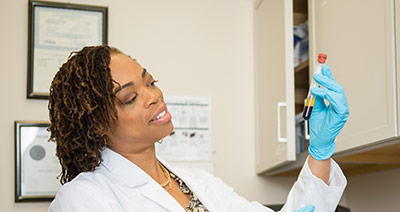Kidney Stone Treatment Overview
Unlike years past when urinary stones were often managed with open surgery, today stones that do not pass on their own are nearly always treated in a minimally invasive fashion.
ESWL was popularized in the late 1980’s and early 1990’s. Before its introduction, open surgery had to be used. ESWL is a procedure whereby the patient is anesthetized and a machine called a lithotripter is used to fire sound waves at the stone. The original ESWL machines involved placing the anesthetized patient into a water bath as a means of transmitting sound waves to the patient. Now, several generations later, these machines are portable and much smaller and simpler. ESWL can be used for stones lodged in the ureter but is more often used for stones in the kidney. ESWL is the most minimally invasive procedure for kidney stones, but its success rates at producing a stone free kidney likely top out at 90% or so. Sometimes a stone will be treated with more than one lithotripsy or in combination with ureteroscopy. Learn more about Extracorporeal Shock Wave Lithotripsy (ESWL).
Ureteroscopy was introduced and became a very common treatment in the early 2000’s. What truly allowed ureteroscopy to develop was the emergence of the use of lasers in Urology and the progress made in fiber-optic technology. Now, ureteroscopes are very thin, rigid, or flexible, thus allowing nearly all stones to be treated this way. Here, instead of an X-ray guiding sound waves as in ESWL, the Urologist uses a scope to reach the stone directly, sees the stone on a video monitor, and uses a laser beam as the energy source to destroy the stone under direct vision. Ureteroscopy will generally require a temporary ureteral stent, which some patients would prefer to avoid but with some exceptions are generally well-tolerated. Ureteroscopy is the most common way to treat ureteral stones but can treat kidney stones as well. Learn more about Uretoscopy.
Success rates with ureteroscopy are slightly higher than with ESWL, but it is a somewhat more invasive procedure that will require stent placement and stent removal at a later date. Both ESWL and ureteroscopy are typically done in an outpatient surgical setting, and it must be understood that in both cases small stone fragments will still need to be passed. The stones do not simply disappear.
As stated above, a percutaneous nephrolithotomy is a much more rare procedure. In the hands of Dr. Engel, this will be offered in the setting of a very large stone, perhaps 3cm or greater. Here, a needle is placed through the back directly into the kidney. This tract is used to place a tube called a nephrostomy tube, and this access will be used in the operating room to allow the Urologist direct access into the kidney with a much larger scope. A nephrolithotomy carries with it more risk such as bleeding, and will require an overnight hospital stay, but at times is the only viable option for some stones.
All patients must know that perhaps the most serious complication after a stone procedure is infection.
All patients must know that perhaps the most serious complication after a stone procedure is infection. Fevers after a procedure could signal infection behind an obstruction, an emergency situation that could rapidly progress to a condition called sepsis which can be life-threatening. Fevers or feeling very sick after a stone procedure is always an emergency so please dial 911 or go to your nearest or favorite emergency room and ensure that Dr. Engel or Dr. Tobon are contacted to take part in your care. As a reminder, USW physicians have privileges at Reston Hospital Center, Holy Cross Hospital Silver Spring, and Holy Cross Hospital Germantown.
If you have been diagnosed with a kidney or ureteral stone, we would be happy to review your films/cd with you during a consultation in our office and make recommendations.





